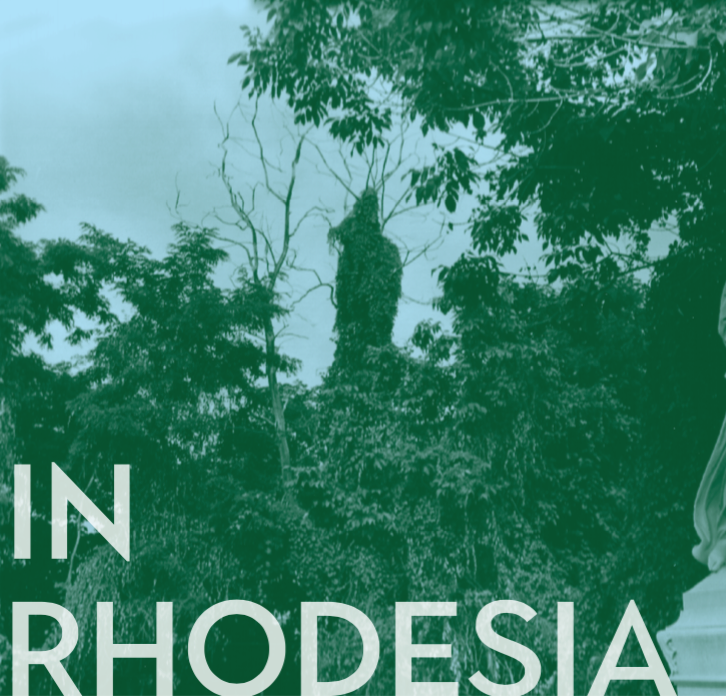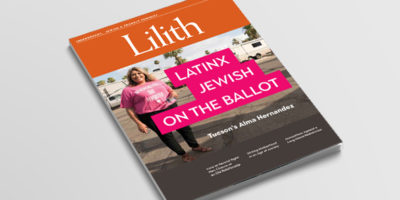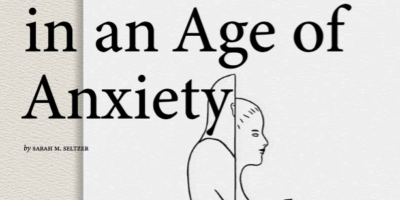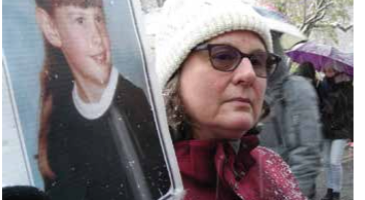
Fiction: In Rhodesia
AS SOON AS HER FATHER DROVE THEIR rental car out of the Meikles Hotel garage, Laura felt that they were outside the protective shell of the hotel lobby, its white walls and marble doors, golden brass chairs and chandeliers, glass crystals dripping from the ceiling. The streets were gray and gritty. If not for the sea of black faces they could have been in an American city, with its busy, crowded streets, tall office buildings you had to crane your head back to see the tops of, and people in a rush to get somewhere. Only 10 minutes later, they had left Harare behind and entered the dry maize-colored land of the bush. Boundaries crossed so effortlessly. Just as only this morning they had own into Harare, stepping straight onto the tarmac from the plane just as her parents told her they had done when they left the country in 1977 for America.
“We are in the bush now,” her father said. When she heard her father say “the bush,” she expected to see wild animals herding past, stampeding bison, a lone elephant. She expected something more exotic than dusty, at land, looking like the Midwest plains except for an occasional bare tree, standing alone, poised as if in a Japanese watercolor.
She kept waiting for her parents to explain things. Usually her father was the one to ll the silence, to tell stories, jokes, but he was quiet, preoccupied. They must be thinking about her brother. Didn’t they care that it was her first time back to the country of her birth?
She felt that familiar feeling of not being able to access her parents’ thoughts or emotions, of a barrier between them. She forced herself to think of her brother, of what she knew of him. When she was a little girl, she used to imagine him sometimes as a bearded angelic figure, stepping down magically from the attic to protect her and express brotherly love. All her life she wanted to be someone’s favorite, for someone to love her most of all.
As if her mother sensed she felt ignored, she said, “Those white bundles are bird’s nests.” She pointed to tufts of white so spun straw buried in the limbs of some of the bare trees, like white cotton candy.
Her mother spoke with the assumed certainty of a tour guide, and she, Laura, was the tourist, the only one who had never really lived here. She had been only two years old when they left, too young to think of this as her homeland. Were her parents thinking about her brother’s death now? They never spoke about it. When she thought about her brother, it was only her parents’ pain that she imagined. She could feel no emotion herself towards this brother she had never known. Only the strange realization that if he hadn’t died, she would not have been born.
Now she was looking outside at a countryside that belonged to her in some way, but she felt empty inside, at and dull like the land outside. This didn’t feel like her birth place; she had no connection to it.
Back home in Long Island, her mother would sometimes bring out a red leather album of photos of her house in Rhodesia: “Would you like to look at pictures of my garden?” she would say, sounding like a little girl showing her treasures, opening the album to reveal photos of herself, newly married, standing in her garden, the tropical bougainvillea, wisteria, jacaranda and rose bushes towering over her with their petals and vines, everything in bloom, the flowers, and her mother, her face breathing in their smell, smiling patiently and happily as if to say, I am young and beautiful, and this happy life, my family’s life, among the lovely flowers will continue forever. In the photo her mother wore a white dress, cinched tightly at the waist and blooming out at the hips, her breasts full to bursting, ready, as if full of milk.
“These were my roses, the tallest roses in Salisbury,” her mother said when looking at the photos of her garden. To young Laura the roses looked towering, as if there were a jungle, a rainforest, in her mother’s backyard. Her mother, a transplant herself, born in Frankfurt, Germany, had arrived as a baby in Salisbury straight o a boat in 1939, and as a young mother had conquered this foreign African soil, learned how to make things grow in the dirt.
When her mother showed her these pictures, it was as if Laura was being let into another life, a world and a past that did not include her. Her mother never said that she regretted coming to the States, yet surely the patch of earth in their backyard in which her mother planted herbs and vegetables, and the circular bed in the front yard around a big oak tree in which she planted tulips in the spring, impatiens in the fall, must have been a let-down from that beautiful garden. If they had stayed, her brother, almost 12 at the time, would have been drafted into a civil war. To risk losing his life for a cause, Zimbabwean independence, that they did not believe in, did not make sense.
Her mother was the one to make the choice. She had lost one son accidentally and was not going to lose another. They were lucky to get out when they did. “If it had been up to Daddy,” her mother said once as they paged through the photo album, “we would never have left. You should always know when it’s time to make a change.”
THEIR CAR WAS NOW IN FRONT OF THE cemetery gates. A sign said Warren Hills Cemetery. The gates were black iron and looked 10 feet high, designed to keep something or someone dangerous out, or possibly to protect what was within. The trees and grass behind the gate were thick, green and lush, in contrast to the relentless dull ochre of the bush. A black man nodded at them, opened the gate, waved them ahead. Her father drove down the dirt path.
The earth was a reddish clay, and little clouds of red-tinted smoke stirred up around her parents’ feet as she followed them out of the car. Her legs felt heavy. She felt dread for the first time she could remember. She didn’t want to see the grave. She didn’t want to follow her parents. What was the point? Duty, obligation, doing the right thing.
“Laura, come on, don’t move so slowly,” said her mother.
Just ahead of them, four black men in white clothes were digging, making holes for graves, or filling in the holes of newly dug graves. They stood several feet away from each other, working fervently as if there were many more graves to dig and not enough time. She didn’t see any Jewish stars on these graves. A thin layer of red smoke wafted into the air around the men. There were no mourners there, just men digging fast, no time for ritual. Just enough time to dig a hole and put the coffin in before the next dead body arrived.
Her father said, “Those must be all the AIDS deaths.”
As they passed, one of the men looked up, paused. The bright whites of his eyes like moons, he looked right at her, nodded, and said, “Good afternoon, young lady.” He spoke in such clean diction, sounding almost English. “The Jewish cemetery is ahead, up on the left.”
She felt uncomfortable. He wasn’t here to mourn anyone but he knew that she was. Ahead of them she could see neat rows of tombstones, gray marble and granite, sticking straight out of the earth like obedient powers. Each had a Jewish star engraved in the top center of the stone. There were more Jews buried here than Jews still living in Zimbabwe. Almost all of the Jews, like them, had left. For a better life. In search of what they had originally come here for, crossing oceans, continual motion. Her own cousins were in Australia, England, Israel. Her family’s graves were scattered across the globe, a diaspora of the dead.
She thought of the yahrzeit candle that once a year on the anniversary of her brother’s death her mother plugged in on the white stand in their narrow front hallway, its Jewish star orange and pulsating. She never saw anyone actually plug it in. It somehow magically appeared on the yahrzeit days, then quietly disappeared before dawn. She would come home from school, see the glowing star, aflame within in the glass, and think, this must be the day that he died. She never said anything. There were a few other days during the year when the candle was lit. But she knew her brother had died in June, a few days before his birthday. Her parents didn’t say anything about her brother on these days; they hardly ever spoke of him.
Once, she had pushed, trying to break into the silences, and asked her mother if she thought of him often and she had said, “Every day.” She remembered being shocked. Every day? That her mother had these thoughts every day, of which she had no clue, 30 years after her brother’s death— did she not know her mother at all? How much of her mother’s life, she wondered, remained hidden within her, only revealed if she asked the right questions?
AS THEY WALKED CLOSER TO THE Jewish graves, their feet kicking up red clouds, she trailed behind her parents, sensing her parents didn’t want her to walk beside them.
She looked at her parents and saw that they were now holding hands. She couldn’t remember having ever seen them hold hands before. She had never felt so alone. Weren’t her parents supposed to take care of her, to comfort her? Now she saw them bend down, almost in unison, like one body, and then with their free hands, like dancers executing a move, each of them took hold of a small white stone from the ground.
“Take a stone, Laura,” said her mother. Why did she have to be told? Was her mother only going to speak to her to instruct? Still, she bent down to pick up a stone. She rubbed it and felt how smooth it was. What was really the point of this stone? She knew it had something to do with respect, duty, Jewish ritual. But a stone felt lacking, empty, dead. It just sat dumb and cold in her hand.
Her parents stopped in front of a small, unassuming gray tombstone. There were larger tombstones around, tall ebony and marble pediments, but so many of these small ones. Her father put a stone on top of the tombstone. Her mother lay down a stone next to her father’s.
She tried to imagine what her parents were thinking. She had thought from time to time of the awful pain of her parents upon coming home from a Saturday night out, returning home happy to that quiet house, imagining the children asleep in bed, or maybe they opened the door into a house filled with wails, the wails of the African woman who was their nanny, then discovering their eldest son, age 11, whom they had said goodbye to earlier that night with maybe a quick kiss, now dead on the floor, having choked on his late night snack because the nanny forgot to make sure he took his medicine for the epileptic
SHE STOOD NOW BEHIND HER PARENTS, still holding hands, their heads tilted down, angled towards the grave. From the back, her parents looked so frail, so slender and pliant, like two entwined plants, bending towards the grave for comfort as if towards the sun. She clenched and unclenched her fingers around the stone, wishing she had someone’s hand to hold.
Suddenly a sharp, high noise came out of her father’s throat. It was something wild. It sounded like a dog’s yelp when his tail has been stepped on. He raised his hand to his throat, clutching it, as if he wanted to stop another cry from emerging, as if he were choking. Her father’s sobs seemed to fill the air; they seemed as if they would last forever, like the at land of the bush that they had passed through. The sounds were ugly, raw, inconsolable.
Her father embraced her mother, sobbing. Then he was quiet. Her parents stood, holding each other. Still leaning on each other, they looked down at her brother’s grave. They didn’t even know she was there. She had misunderstood. They didn’t really care about her. Maybe they didn’t really love her. She was an obligation, something they had to care of. They had thought they wanted a child in their old age, to make up for her brother’s death, but it had been a mistake.
Suddenly her father turned around to face her. He was standing right in front of her now.
“Laura,” her father said. Laura, Laurence—her whole life that had been what she shared with her brother, the only thing she shared with him, a direct link, her name given in memory of his, the constant reminder that she had followed him, her life was meant to honor his, and that if not for his death, she would not be here.
“Daddy?”
“I have something to tell you.”
Her father embraced her. Her mother was still standing by the grave, facing it. Her father’s body was overcome by shudders and his sobs went right through her, shaking her along with him, as if his sobs were her own; his tears fell, warm and wet, on her cheek.
Her father moved his head back a few inches so that he looked right into her eyes. “I see him in you,” he said. “I’ve never told you this, but I see him in you. I always have. I hear him in your voice, see him in your face. Every day.”
The words washed over her, each phrase smacking her like a small wave. He spoke as if these were words that until this moment had been stuck inside of him, words spoken as a revelation, a consolation. So they were connected beyond a name, she and her brother. But she felt sorrow pressing down on her.
Her father looked at her, his eyes wide, imploringly, as if awaiting a response, expecting some words. She wanted to tell him that she felt a burden now. But she didn’t say anything.
“Hannah, I just need a minute.” He walked past her mother in the direction of their car.
Her mother was still facing the grave. Then she turned towards Laura.
“It’s time to leave. I’ve said everything I needed to say,” her mother said. She looked at Laura. Her eyes were dry. “It’s easier in life to be like that, to cry,” said her mother. Laura wasn’t sure what she meant at first. Then she realized she was talking about her father. Still, she wondered, did her mother want to be like that but was unable to?
“I can’t cry,” she said to her mother. “I want to. But I can’t.”
“That’s because you’re like me.” Her mother meant—strong, not overly emotional.
She wanted to say no, she wasn’t like her. But for all she knew, maybe she was. She looked back at her brother’s grave and said to herself, goodbye. She knew this probably would be the last time she saw his grave, the last time she visited this country.
Her father was up ahead of them. He looked steadier somehow, more solid, as if shedding those tears had strengthened him.
“We need to go wash our hands,” her mother said.
She followed her mother to a low gray stone wall where there was one silver metal spigot. Her mother turned the spigot until water came out of the faucet. Her mother put her left hand under the water, the reddish dust running over her hands, along the stone sink and into the drain like faint blood. She rinsed her right hand until it was clean. She turned the water off.
“We wash to leave the dead behind,” her mother said. Laura turned the spigot and felt the cold water wash over first one hand, then the other. The ritual was comforting. Her hands were clean. As they walked past rows of Jewish stars flagging the red African dirt, she took her mother’s cool, moist hand and held it in hers, and in this way they gave each other comfort.
Laura Hodes writes for the Forward, and has been published in Slate, the Chicago Tribune and Kveller.com. A version of this story will appear in her novel-in-progress, Arrivals and Departures.




